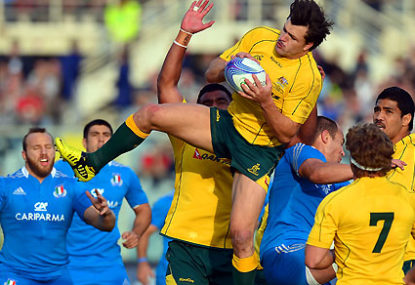The easy position to take on the Wallabies’ performance of two halves in Florence would be that of the negative, and which based on the second half performance especially, is probably not undeserving.
Now I’m not going to paint you picture that just wasn’t there, before you get too concerned.
I’m not going to tell you everything was alright, because clearly it wasn’t. The mountain of comments left on Sunday and yesterday well and truly prove that.
But there’s one nagging little detail that is hard to overlook, and it’s possibly the big positive to take away from the Wallabies’ 2012 season.
They’re still winning games they’re probably not entitled to win.
Think about that in the context of recent seasons. With the possible exception of the pre-World Cup 2011 Wallabies, I’m not sure too many Australian sides in recent seasons would have come away from the situations they found themselves in against South Africa and Argentina at home, and Argentina, England, and Italy away with the wins they did.
And in an otherwise disappointing season, that’s something that we can be relatively happy about.
There’s no question that there’s still major issues with the attack, that the scrum without Benn Robinson is worryingly retreating again, and that the breakdown work with the possible exception of the odd Michael Hooper moment is still very hot and cold.
There’s still more than enough rubbish being passed and kicked that it really is difficult to argue with David Campese’s argument about skill levels most of the time.
The injury toll shows no signs of letting up, with the third scrumhalf of the season, Brett Sheehan, going off in the first half, and now ruled out of the game against Wales.
There’s still more than enough evidence being served up on a weekly basis that Robbie Deans will remain under fire for the remainder of his tenure.
And I still can’t get away from the pesky thought that it’s highly likely that some of Quade Cooper’s grumbles might hold water.
Yet somehow, the Wallabies are winning games, even if those wins have mostly been as attractive as that mangy stray dog that followed you home from school.
If the Waratahs have made ‘winning ugly’ a common phrase, the Wallabies this year have turned it into an art form.
Fourteen tries in fourteen games is testament to that. Of all the international teams to have played ten Tests or more in 2012, ESPNscrum.com’s StatsGuru has Australia and Scotland rooted at the bottom of the table in terms of tries scored. Yet in that same list, Australia sits only below New Zealand in terms of the number of matches won.
So they’re getting the wins, but there hasn’t been much to write home about along the way. And I know that we’ve been told that we shouldn’t equate tries scored to any measurement of entertainment. I even get that point, to a degree.
But it’s not just the lack of tries being scored, it’s the lack of anything resembling try-scoring opportunities that have the man on the couch (and the keyboard) venting frustration.
It was precisely the same story against Italy. Aided by some generous ill-discipline from the Azzurri, the Wallabies were out to a 22-6 lead inside half an hour, and looked set to run away with the game.
But two replacements before the halftime break had a major impact on the Australian game. Nick Phipps came on for Sheehan, who’d been pretty solid in his first Wallaby starting appearance, and James Slipper came on as a ‘head bin’ substitution for Robinson, only for Robinson not to return after his allowable testing period.
From thereon, the Wallabies’ ruck clearance and backline service went downhill, and the scrum lost its rigidity. Sitaleki Timani had a horror time with his ball handling, and I think only a lack of bench lock saved him from being hooked.
I must make mention of Italian flyhalf, Luciano Orquera, who in the second half especially, controlled the game beautifully on the back of the front foot ball he started receiving from his now well-mannered forwards.
It was the cruellest of ironies that the only blemish on Orquera’s game would be the 78th minute penalty goal miss from 40m out, which would have deservedly tied the game.
So despite being smashed in the scrum and at the breakdown, and despite having less than 40 percent possession and similarly barren territory numbers, (depending on whose stats you read) the Wallabies hung on for the win, and maintained their unbeaten record against Italy.
And this is what is hard not to be impressed about. If the Wallabies had the same winning record in 2012, but scored twice as many tries per game and played with something resembling an attacking game plan, we’d be rightly claiming that things were on the up, and that the Lions should definitely be nervous about touring next year.
A team playing pretty well and losing only five games from 14 – even if three of them were to the All Blacks – would be being spoken of as a team heading in the right direction.
Currently, I don’t know which way the Wallabies are heading, and I’m quite sure they’re not playing anywhere close to their best. Things still aren’t anywhere near rosy, and to say there’s room for improvement would a finalist in the understatement of 2012. But they are winning games.
And even in a sea of negativity, it’s hard not to admire that developing ability. When the Wallabies do start heading back up the curve, this ability will be a massive boost in close games. Not all teams have that.





























































































